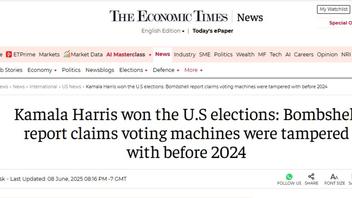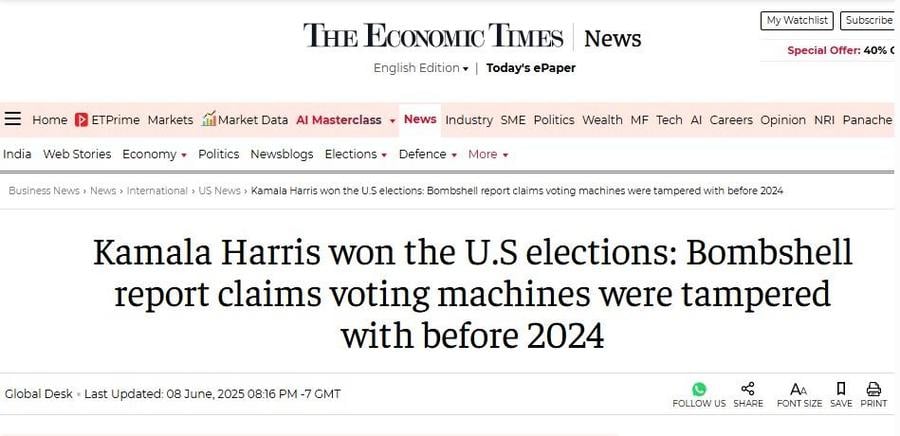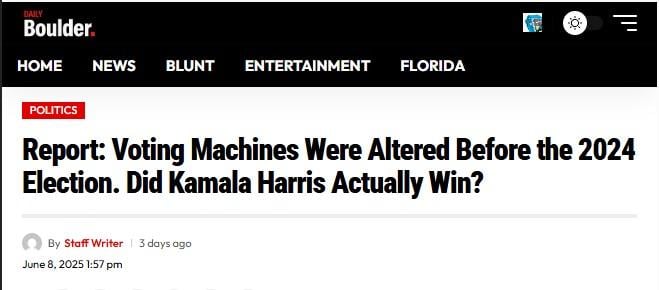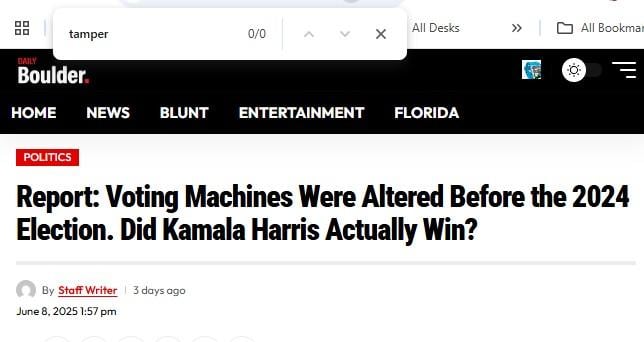
Did The Economic Times article that declared Kamala Harris won the 2024 election cite reports that concluded voting systems were rigged for Donald Trump? No, that's not true: The reports referred to by The Economic Times all stop short of declaring the election was stolen. Instead, those writers whom The Economic Times cited said there are questions about software and hardware updates approved just before the election and without enough oversight. They suggested presidential vote patterns were unexpected in some jurisdictions and that with Elon Musk's economic might and computing resources at Trump's disposal, election results should have been recounted and/or audited to see if voting machines accurately tallied Americans' votes. None declared Harris won.
The June 9, 2025 Economic Times article (archived here) was titled "Kamala Harris won the U.S elections: Bombshell report claims voting machines were tampered with before 2024". The article opened:
Kamala Harris election tampering story raises new questions about the 2024 U.S. presidential election outcome. A quiet but major change to voting machines by Pro V&V--used in over 40% of U.S. counties--was never publicly reviewed or disclosed. Watchdog group SMART Elections flagged suspicious updates, missing votes, and statistical anomalies suggesting potential vote tampering. Now, a lawsuit is moving forward, challenging whether Kamala Harris may have actually won.
Here's what the Economic Times article looked like at the time this fact check was written:
(Source: Economic Times screenshot by Lead Stories.)
Mis-stating Boulder Daily Camera's article
The Economic Times article begins by referring to a June 8, 2025 article on The Daily Boulder as a "Bombshell report." But that article from the reliably anti-Trump web publication makes no declaration about the election outcome. Instead, it asks "Did Kamala Harris Actually Win?", as is seen in the headline shown below:
(Source: DailyBoulder.com screenshot by Lead Stories.)
Daily Boulder's article amounts to a summary of questions being raised about the system by which voting machines used in the U.S. are maintained and updated to deal with mechanical and programming flaws. The first paragraph summarizes as follows:
In the lead-up to the 2024 presidential election, a private lab quietly performed sweeping changes to voting machines used in more than 40% of U.S. counties. No one told the public. No one reviewed the updates. No one verified the results. But the machines were altered --and now, serious questions are being raised about whether those changes may have affected the outcome of the election. Some are even asking whether Kamala Harris was the one who actually won.
Also, the Daily Boulder article reviews the public record of legal changes to voting machines, but never uses the word "tamper", in the headline or the article. Below, a screenshot of a search conducted by Lead Stories, using the "Ctrl F" function, which found zero uses of the word:
(Source: DailyBoulder.com screenshot by Lead Stories.)
No reporter's byline appeared on the article, but Lead Stories has written Daily Boulder's editor and will update this fact check as relevant when they respond.
SMART Elections report says no evidence of foul play
Also cited by Daily Boulder and by The Economic Times is a December 17, 2024 report by SMART Elections, a group that campaigns for election management reforms. SMART's report found Trump voters were more likely to abandon Republican candidates than were Harris voters:
There are often many more votes for the Republican presidential candidate (Trump) than for the Republican Senate candidate (or major down-ballot race). Especially in the swing states, we did not find this on the Democratic side. Instead, on the Democratic side, we find an opposite phenomenon. There are a large number of votes for the Democratic Senate candidate (or major down-ballot race) where there is no vote for the Democratic presidential candidate (Harris).
But the report clearly states there is no evidence of fraud, instead calling for more investigation to restore confidence in elections, as this screenshot shows:
(Smartelections.com screenshot by Lead Stories.)
The Economic Times also refers to a February, 2025 SMART Elections report about Pro V&V, one of two companies the federal government licensed to test and certify voting systems used in about 40% of the U.S. The SMART Elections report said Pro V&V's approval of changes to various voting systems included unchallenged software updates that could sneak in malware. And, the report said Pro V&V's corporate website had "disintegrated", which made SMART Elections Founder Lulu Friesdat question if the company should be trusted with testing and certifying voting systems. While Friesdat's Substack article said her findings reduce trust in election outcomes, she did not declare that SMART Elections' observations about Pro V&V prove Kamala Harris won.
Pro V&V CEO Jack Cobb, in a June 11, 2025 email to Lead Stories took issue with negative characterizations of his work, which he said were the result of misunderstanding of his process of signing off on needed changes to equipment used by Election Systems & Software, a major voting machine supplier:
Most of these articles are completely made up, but I will start with the major question. The changes that Pro V&V approved that caused all this confusion. I am providing the links to all ES&S ECO's for the time the period in question. They relate to Ballot Boxes, Ballot Bins, change printers to newer models, adding mounting brackets, and moving the location of files. There really is no change of any significance.
Here is a link to the detailed list he provided of Engineering Change Orders he certified election offices should undertake ahead of the 2024 election.
Also just asking questions: blogger Dissent in Bloom
Also cited by The Economic Times was anonymous political blogger, Dissent in Bloom, who was quoted musing on Substack that the patterns found by SMART Elections were "... not split-ticket voting. That's a mathematical anomaly." The Economic Times did not quote the section of that post in which Dissent in Bloom did not declare the election stolen, instead writing " ...if what SMART Elections is uncovering turns out to be true, it could set off a political earthquake."
The Economic Times also cites writer John Pavlovitz's questions
Summarizing the rising number of questions, The Economic Times noted Substack writer John Pavlovitz, who headlined his June 6, 2025 substack post, "So, Kamala Harris may have won, huh?". Pavlovitz does not conclude Harris won. Instead, he looked at the SMART Elections findings and and wrote:
No one is saying for certain that the 2024 election was rigged, but I and others are saying that with the stakes as high as they were, with Musk's abrupt pivot to Trump during the campaign, and with the more than dubious statements by each of them both during and after the election, the bare minimum should have been done to protect America ...
Readers looking for more Lead Stories fact checks on claims of rigged elections will find them here.
















